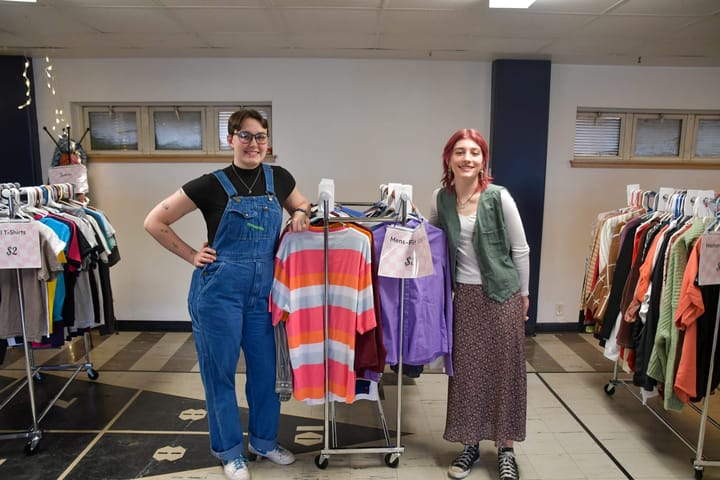Federal regulations keep international students from on-campus work study
ELLIE RONNING
ekronning17@ole.augie.edu
REBEKAH TUCHSCHERER
rjtuchscherer16@ole.augie.edu
When junior Uyaruun (Joy) Purevdorj needed a college job, she wanted to work in the business office.
Instead, she served Augie Bowls in the Ordal Dining Hall during her freshman year as a food service worker.
“I remember food service was the last thing I wanted to do,” Purevdorj said. “For most of the international students, they didn’t want to do it either.”
International students have limited job options, according to Jessica Fauteck, assistant director of international student advising. Work study positions are filled primarily by FAFSA-qualifying domestic students, and visa restrictions don’t permit international students to work off campus for their first nine months in the United States — which is almost all of freshman year.
If an international student wants to work while in the United States, they must go through a long process, according to Fauteck. The process includes applying for a job, landing a job-offer letter and applying for a social security number.
The International Programs Office (IPO) tries to direct students the best they can in their on-campus job searches but cannot place them in specific positions, Fauteck said. If international students want to work off-campus, they face the extra hurdle of finding a job that corresponds to their major.
This means despite having previous work experience as a translator in her home country of Mongolia, Purevdorj could only work for Augustana Dining Services, the food service provider on campus, to earn some cash.
“As American students, you have more options,” the computer information systems and business advertising double major said. “I didn’t really have a choice.”
Dining services opens arms
Now a junior with over two years spent in the United States, Purevdorj’s job options have opened up. She no longer works for dining services, but as a chapel staff member and peer navigator for Augie Access.
In spring 2019, 42% of working international students were employed by Augustana Dining Services, according to the International Programs Office. As of Sept. 16, 11 international students are employed by dining services according to the IPO, and about five domestic students according to Damian Lewis, the general manager for Augustana Dining Services.
Working for dining services is technically an on-campus job, which allows students with visa restrictions to easily work for them, Lewis said. However, it is not a federally-funded work study position.
“We try to hire any student,” Lewis said. “We have many positions available that are customer forward positions so [students] can interact with their peers.”
Last spring, 26 international students worked for dining services. The next most highly populated job by international students was tutoring, which had positions for 12 students at that time. Other jobs for international students included physics, chemistry and biology teaching assistants, recreational services, Learn to Swim and admissions, among others.
“These [non-dining services positions] are available,” IPO’s Fauteck said. “But you can’t do that as a freshman.”
Campus stereotypes
Many students have asked Purevdorj if only international students could work in the Augustana Dining Hall, the Mongolia native said.
“It makes sense because it seems like every international student we see works up [in the commons],” she said.
A culture where student dining hall workers are largely international immediately creates the perception of a second-class tier for those who work in food service, according to Audrey Cope, Augustana Student Association vice president.
“The optics of it are very disturbing, and that needs to be corrected right away,” Mark Blackburn, Dean of Students said. “It’s an institutional problem.”
But there’s some hope for change
Over the summer, a taskforce of representatives from financial aid, the business office, student affairs, the IPO and faculty members was assembled to establish more international student positions and find a source of long-term aid to fund them. ASA is also a partner in the taskforce.
“We want to comb through the budget of every department,” ASA president Luca Amayo said. “Hopefully, the push that we can make will be enough to create some immediate change.”
Amayo and Cope have urged departments to allocate some of their budgets to pay for international student salaries, an initiative that was immediately backed by University President Stephanie Herseth Sandlin, according to Cope. The overall goal is to have mandated funding for international student jobs in each department.
It’s not known if new positions for international students were created over the summer, as departments are not required to report those statistics to the Dean of Students office or IPO, according to Fauteck.
However, access to campus jobs for international students is a “work in progress” and “slowly but surely improving,” Fauteck said.
Blackburn said he wants every department to rearrange their budgets to the best of their ability to help international students.
“We are a small school, but we have a great sense of community,” Blackburn said. “If we are who we say we are, we will look and turn over every stone to help the constituents of our community.”



